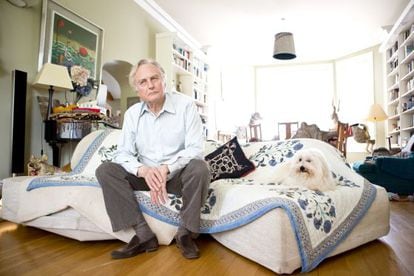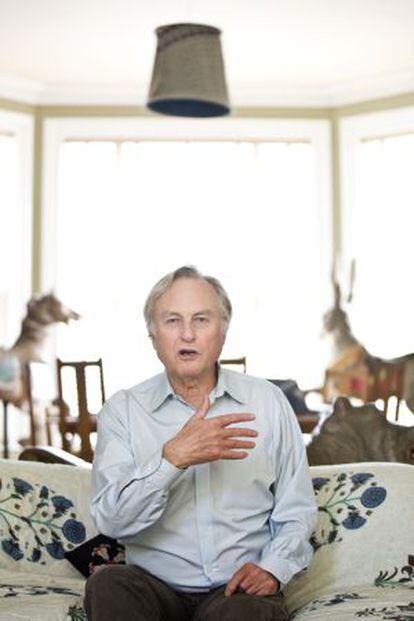“We shouldn’t bring children up to believe in gods and fairies”
One of the best-known figures in the science world speaks to EL PAÍS

When he was a child growing up in the 1940s, Richard Dawkins explains, he realized Father Christmas was actually a friend of the family in disguise. An early disciple of Charles Darwin, Dawkins has gone on to unmask what he sees as bigger, and more dangerous illusions – God, for example. What’s more, he’s made it his life’s work to help the rest of us see this. He first came to the attention of the public for his 1976 book, The Selfish Gene, in which he argued that we are nothing more than vehicles for genes, simply machines programmed for their wellbeing: “The body of an animal is nothing more than a temporary repository.”
He has created a career as a successful writer about science, and is a regular on television debates, having also produced his own documentaries. The advent of the internet has seen him use social networks to further his arguments. He sees his mission as fighting what he considers to be religious dogma, superstition, and pseudo-science. In 2006 he published The God Delusion, which aims to rid readers of any last vestige of faith in the Almighty they might have retained. It’s a fiercely argued polemic, with brilliant touches of irony that dismantle the arguments of Christianity and other religious beliefs.
In The Greatest Show on Earth, published in 2009, Dawkins provides a powerful argument based on scientific evidence for natural selection. His target here is creationism, the idea that the world was made in six days by God, and that mankind lived with the dinosaurs, – teachings that powerful right-wing Christian groups in the United States are determined to have introduced as part of the national curriculum.
Now aged 73, Dawkins recently published the first volume of his autobiography, called An Insatiable Curiosity, which has just been translated into Spanish. In it he explains how he became the person he is, from his childhood growing up in Kenya, where his father was a colonial official, until he moved to England at the age of eight. He attended public school in the 1950s, then attended Oxford and Berkeley. We get to know about his ancestors and family, his teachers and classmates, and the writers who influenced him, and end with the publication of The Selfish Gene.
The interview takes place in his home in Oxford, in a large living room filled with African art, along with a piano. Two small dogs run around, happy to have visitors to play with.
The tribe and its gods
We’re just a few hours away from the referendum that would result in Scotland voting to remain part of the United Kingdom. But Dawkins won’t be drawn on Scottish nationalism.
Question. We’re seeing nationalist tension in Scotland, in Catalonia and Ukraine. Is this a return to tribalism?
Answer. We could say that the nationalism in those places is a form of tribalism. One might ask oneself why it isn’t happening in even smaller places, like Cornwall or Wales. The social sciences are complex, so is politics… As a biologist, I’m not the right person to give an answer.
Q. I’m asking you in your capacity as a biologist, a writer, and activist. You have said that religion is at the center of many current conflicts, such as in Syria and Iraq, Palestine, or Ukraine; and before that in Yugoslavia or Ireland. Aren’t they really fighting more for land than for their idea of God?
A. I don’t think that conflict is motivated solely and directly by religion. For example, in Northern Ireland it is between Catholics and Protestants, but I don’t think that the people planting bombs are concerned about the dogma of transubstantiation. Religion simply provides a label: in Northern Ireland, people identify themselves as Catholics and Protestants, despite speaking the same language and being the same color. Even your name identifies you: if your name is Patrick, then you’re surely a Catholic; if it’s William, then you’re a Protestant. This becomes the tribe: there are two tribes in Northern Ireland, and it’s been like that for centuries.
Q. You say in your book that you were a very religious child, an Anglican, until you were about 13. What happened? Was it Darwin?

A. I was aware that there were different religions from the age of nine: Buddhism, Islam, Hinduism, the polytheism of the Greeks, the Vikings… Any child would have thought that his religion was right. I was given the right preparation to be anti-religious. I don’t know how I stayed with Christianity, it must have been the influence of school. But yes, it was Darwin, and it was Darwinism that saved us from all that. When I was about 15.
Q. You’re not an agnostic; you’re a militant atheist. Why is it so important to take on religion?
A. That depends on your definition. Agnostic means, “I don’t know”. A definition that I support says that it is somebody who has no positive belief in a god. The atheist believes positively that there is no God. I do not have that belief. What I have is no reason to believe in God, in the same way I don’t believe in fairies. As a scientist, I am moved by the beauty of the world and the universe. As an educator, I think it is perverse that children are educated to believe falsehoods when the truth is so beautiful.
Q. And can’t atheism also be dogmatic and intolerant?
A. One always has to argue one’s corner, and not silence people. For centuries, we have accepted that you can’t criticize religion. Doing so seems intolerant, but it isn’t.
Raising skeptics
In one passage of his book, Dawkins expresses his opposition to the way in which most families instill belief of magical explanations in their children. “I can’t help asking myself if a diet of fairy tales filled with spells and miracles, including invisible men, is damaging from an educational perspective,” he writes. “Why do adults encourage incredulity in children? What’s wrong with playing a simple question and answer game with children who believe in Santa Claus that will give them something to think about? How many chimneys must he visit in a night? It’s not about saying that Santa Claus doesn’t exist, but of encouraging the habit of skeptical questioning.” He accepts that this approach is unpopular: “Every time I raise this question, I get kicked out of places for trying to interfere in the magic of childhood.”
His skepticism isn’t just directed against religion: it is also pointed at superstition and pseudo-sciences (astrology, clairvoyance, palm reading, tarot cards) and which he addresses in his 1998 essay Unweaving the Rainbow. But he is less dismissive about so-called alternative medicine: if it is proven to work, then it ceases to be alternative. But not in the case of homeopathy: “It’s interesting: using the double blind [whereby neither the patient or the pharmacist knows which is the drug and which the placebo] there is no difference. They are both placebo.”
Dawkins is highly critical of our educational model whereby the teacher dictates a lesson to his or her pupils, who then memorize it, rather than encouraging them to teach themselves or to investigate on their own. “As a student, I once forgot my pen and at that time I was too timid to ask the girl sitting next to me. So I simply sat down and listened, and when I got home, I realized that this is the best way to learn. The teacher’s job should not be to teach, but to inspire people.”
Getting burnt on the social networks
Dawkins is a regular presence on Twitter (@RichardDawkins), and makes an effort to provoke argument, as well as retweeting or replying to other users’ comments. He says he has got into trouble more than once. “Twitter is a strange place because there are a lot of people shouting. A drunk or an idiot can shout at you in the street. On the internet, that effect is multiplied. You have to have thick skin.” And he certainly does.
Q. Are there any tweets you regret sending?
A. Yes, because they can be so easily misinterpreted. Sometimes I see that I could have avoided it.
Among his more controversial comments was the time he said: “Date rape is bad. Stranger rape at knifepoint is worse. If you think that's an endorsement of date rape, go away and learn how to think,"
Q. In a country like yours, which is up in arms over repeated sex scandals, that comment seems to show a lack of sensitivity toward the victims of sexual abuse.
A. I think it is stupid to deny that there are different degrees of sexual offenses. There are people who for emotional reasons want all sexual offenses put on the same level. It’s as though somebody stole your wallet and you think that is the same as robbing a bank at gunpoint. Both are offenses, but one is more serious than the other, don’t you think?
Q. I think that any kind of rape has serious effects in the long term.
A. So do I.
Q. And I find it hard to think of a moderate or light rape.
A. I won’t let you get away with that one. You are accompanied by plenty of stupid people on Twitter. When one says that one thing is worse than another, one isn’t approving it.
Dawkins also offended many in the Twittersphere when somebody asked him what to do if the child she was expecting turned out to have Down’s Syndrome. “Abort it and try again. It would be immoral to bring it into the world if you have the choice,” he replied.
Q. Do you really think that it is a moral obligation to abort in cases such as Down’s Syndrome?
A. I said that I personally think it is immoral to have the child, not that it was a universal rule, but it is for me, and 90 percent of women would do so under those circumstances. Do you know what happens to them? They die young, they suffer terrible diseases, mental deficiencies. I think that when the fetus is still not properly developed, and there is no central nervous system, it is better to abort. I have been bombarded with photographs of children with Down’s Syndrome accompanied by texts asking if I want to kill my child. Of course I don’t want to kill their child, but simply prevent more like them coming into the world when they are nothing more than a tadpole.
Science fiction ethics
Asked about the ethical dilemmas that might present themselves in the future, Dawkins accepts the challenge, but warns that we are entering science fiction territory. The much-vaunted artificial life that geneticist Craig Venter is working with leaves him cold. “I think I am right when I say that he simply trying to create new versions of bacteria that already exist. As bacteria reproduce and clone very quickly, if you use them for something useful, for example converting waste meat into fuel, then you are doing something real.”
Q. Are you concerned about human cloning?
A. I am horrified at the thought of Aldous Huxley’s Brave New World coming true, with production lines of thousands of identical human beings being created to become gardeners or some job, because I am a product of the 20 century and that is a long way from the world to which I am accustomed, to my values. If somebody wanted to clone me, I think that would be interesting, I would be very curious, but I would want to be the first to do it, because I would be the victim of so much awful attention.
On one television appearance, it was suggested that his genome be buried in his family tomb so that at some point in the future, it could be recovered by scientists and he could be recreated in, say, a thousand years. This was an excuse to discuss cloning, and Dawkins was asked if the clone in the future would be him.
“Of course it wouldn’t be me. That is like asking two identical twins if they are two people or if one is a person and the other a zombie. The other thing that they were going to ask me to do was to write advice for my clone so that he wouldn’t make the same mistakes as me.”
Q. You question the concept of personal identity in your book, given that cells we have are not those that we were born with. So we are only their memory.
A. This is an interesting question for philosophy. Imagine that you could make a perfect replica of your body, not a clone in the genetic sense, but a copy of each atom. This cannot be done scientifically, but it can be done philosophically. The replica would have your body, all its memories, the same thoughts. Which of the two would be you? But once they are there, they would begin to separate, to have new experiences, in which case, which are you? These are questions that cannot be answered through experiments, but are fascinating from a philosophical perspective.
Q. Stephen Hawking says that philosophy is dead, because science offers the answers today.
A. I don’t think that philosophy has died, but it has lost ground.
Q. You say that the Second World War would not have happened if Hitler’s father had sneezed at a given moment. And in another, that in an earlier time, you would have been a clergyman. Is everything down to chance? Are you a skeptic or an atheist by chance?
A. Reality is about small details. We know that all mammals come from an individual that existed during the time of the dinosaurs. If that small mammal had died before reproducing, then the mammals might be here, but they would be completely different. Perhaps that mammal survived because a dinosaur sneezed. As regards the example of Hitler, each of us is alive because one among many millions of sperm cells fertilized the ovary. The slightest movement during our grandparents’ copulation, a dog barking, and they lose concentration or move, would have resulted in a different outcome. That is why I said that a sneeze a few years earlier would have meant no war. And none of us would exist now if Adolf Hitler hadn’t existed.











































